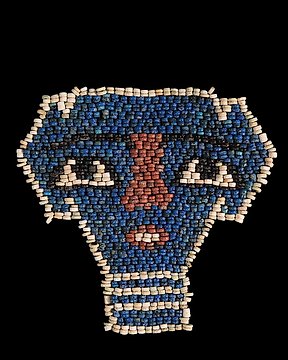
Antiguo Egipto Fayenza Máscara de momia con cuentas
N.º 84025435

N.º 84025435

A fine Egyptian mummy mask made of small faience beads, restrung in their original arrangement. The mask is beautifully rendered with red, black, cream, turquoise, and green beads. The large trapezoid eyes, long thin eyebrows, broad nose and small mouth are arranged in a symmetrical manner, depicting a stylised human face with neutral expression. The mask has a tripartite panel under the chin of the mask, followed by a beaded composition forming a winged scarab, rendered in multi-coloured faience beads. Under the beaded scarab are the four Sons of Horus. It is very rare to have this enlarged group rather than just the face. Elongated faience beads frame the entire composition.
Masks such as this would have been placed over the face of the deceased at their burial, mostly for decorative or protective purposes. Their un-naturalistic features make it improbable that they were modelled after the face of the deceased individual. Rather, they more likely depicted generic images of a human face. Such masks have been also interpreted as visual representations of the god Osiris, due to their blue-greenish colour, normally reserved for depictions of the dead god Osiris on the walls of the tombs. According to mythology, the Four Sons of Horus each were attributed a different organ to protect. For Imsety, the liver; for Duamutef, the stomach; for Hapi, the lungs; and for Qebehsenuef, the intestines.
Measurements: Circa 20cm x 11.5cm
Provenance: From Mariaud de Serres collection, Paris 1980-90s.
Cómo comprar en Catawiki
1. Descubre algo especial
2. Haz la puja más alta
3. Paga de manera segura